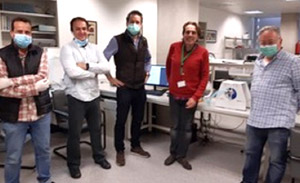New mechanical ventilator for patients with COVID-19
The UPV leads his development and the CEV coordinates to the numerous willing companies to produce it already on a large scale
[ 30/03/2020 ]
The Universitat Politècnica de València (UPV) has led the development of a new mechanical ventilator, ready for a quick industrial production. It would provide hospitals with these devices for treating COVID-19 patients.
Along with the UPV team, researchers at the Instituto de Biomecánica (IBV) and the Technological Institute AIDIMME, both in Valencia (Spain) have participated. In addition, experts in respiratory mechanical ventilation have also collaborated in the development of this new ventilator, especially, Dr. Daniel Navajas and Dr. Ramón Farré, from the CIBER of Respiratory Diseases (CIBERES)-University of Barcelona, and Dr. Rafael Badenes, from the Group of Anesthesia Research of the INCLIVA Biomedical Research Institute of the Hospital Clínico de València, Chief of the Anesthesia Department in the Hospital Clínico and Organ Transplant Coordinator in Valencia province.
Shortness of breath is one of the symptoms associated with COVID-19. It is estimated that between 3 and 7% of people infected with the virus will require mechanical ventilator systems. “With the incidence of this pandemic, our health system can reach saturation. Our work seeks to increase the number of ventilators available in our hospitals. The unit has already been validated in the laboratory and it is ready to be produced on a large scale, as soon as the project obtains the permission of the Agencia Española de Medicamentos y Productos Sanitarios (Spanish Agency of Medicines and Health products),” says Javier Saiz, director of the Center for Research and Innovation in Bioengineering at the Universitat Politècnica de València and coordinator of the research team developing the ventilator.
Developed in ten days
This ventilator has been developed in just ten days. It consists of a controlled electro-mechanical device that will keep the respiratory cycle working in critical patients. This device is notable for its simplicity, its user-friendliness and a small size. “In addition, its design allows companies to quickly and simply manufacture it,” explains Carlos Atienza, Health Technology Innovation Director at the Instituto de Biomecánica (IBV) and coordinator of the mechanical development of the ventilator. The design and manufacturing of the two first prototypes was done in record time (five days) by the IBV technical team, including José Navarro, Fernando Molla and Daniel Gómez; and at the Ci2B, including Julio Gomis-Tena and Alberto Hernández, with the collaboration of professors of the Mechanical Engineering Department (DIMM) at UPV, led by Eugenio Giner.
The system will allow health care professionals to control the respiratory cycle frequency, air volume and pressure. Moreover, it has several sensors and alarms for providing a suitable control of the patients’ breathing. According to the experts in the project, “It totally meets the requirements to keep a critical patient’s respiratory system working,” explains Javier Saiz.
For validation, the team led by UPV has had the collaboration of the Virtual Hospital of the Universidad Católica de Valencia, which provided a simulator capable of reproducing the physiological conditions of COVID-19 patients (ASL 5000 of the company Medical Simulator). Companies willing to produce it on a large scale before being validated at the laboratories of the Polytechnic City of Innovation, scientific park of UPV, many companies have shown their interest in producing it on a large scale.
The Confederación Empresarial de la Comunitat Valenciana (CEV), with the support of several entities, such as the Valencian Automotive Cluster (AVIA, in Spanish) is coordinating companies interested in serial production.
In addition, UPV has several Valencian companies in the automotive sector, such as Agfra, CLR, Itera, Sinfiny, Nutai and IT8, as well as companies in the metallurgical industry and other sectors, such as Factor, Rodytrans and Celestica, that are providing their know-how in manufacturing processes, material selection and preparation of the supply chain, for eventually manufacturing and assembling the product at an industrial scale. Other companies have also shown their interest in taking part in the project, including Power Electronics and IR Technology.
This initiative corresponds to the idea of the following engineers of the Universitat Politècnica de València: Guillermo Vilariño, from the Center for Biomaterials and Tissue Engineering; Javier Martínez, from the Instituto de Ingeniería Energética; Fernando J. García-Diego, from the department of Applied Physics, and Javier Saiz.
Outstanding news
 Study a degree at the best technological university in Spain
Study a degree at the best technological university in Spain
The Universitat Politècnica de València is ranked number 1 among Spanish technology universities, according to the Shanghai ranking
 Highly Cited Researchers 2025
Highly Cited Researchers 2025
Avelí Corma, Juan Bisquert and Luis Guanter, the international scientific elite with a Universitat Politècnica de València hallmark
 Historic Milestone in Spanish Higher Education
Historic Milestone in Spanish Higher Education
The UPV inaugurates the Beihang Valencia Polytechnic Institute, the first Spanish university center in China
 Study in English
Study in English
The UPV offers eight degrees, 16 master's and 650 courses in English for the 2025-26 academic year
 A Latin Grammy... with the UPV hallmark
A Latin Grammy... with the UPV hallmark
'Music teaches us to listen and live together,' says Rafael Serrallet, Doctor of Music at the UPV, awarded in Las Vegas as the author of the Best Instrumental Album of 2025
 THE Impact Ranking
THE Impact Ranking
The UPV, the Spanish university with the greatest social and economic impact in the world

